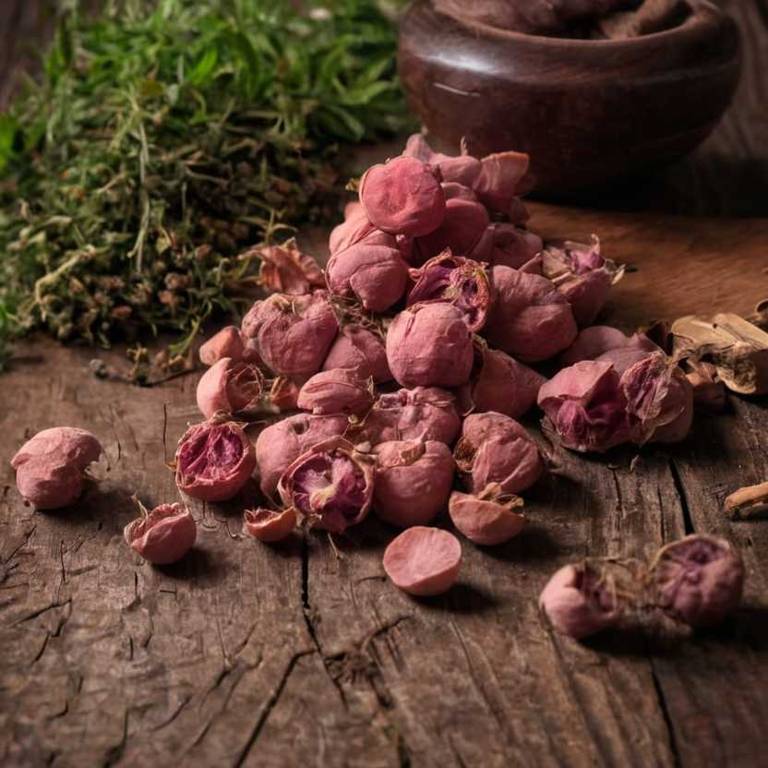By Leen Randell
Updated: Jul 07, 2024
What Are The Medicinal Properties Of Prunus Persica (Peach)?

Prunus persica, also known as peach, has health benefits such as reducing inflammation and improving cardiovascular health due to its high content of fiber, vitamins, and minerals.
The medicinal constituents of peach include flavonoids, phenolic acids, and carotenoids, which contribute to its therapeutic properties. The leaves and flowers of peach are used to prepare teas, tinctures, and infusions to treat various ailments. However, consuming excessive amounts of peach may lead to gastrointestinal discomfort and allergic reactions.
Prunus persica should be used under the guidance of a healthcare professional, especially for individuals with allergies or underlying medical conditions.
This article explains the health benefits, active constituents, medicinal preparations, possible side effects, and precautions related to Prunus persica.
What are the health benefits of Prunus persica?
Prunus persica, also known as peach, has health benefits such as high antioxidant and anti-inflammatory properties.
The fruit is rich in vitamins A and C, potassium, and fiber, making it beneficial for cardiovascular health, digestive health, and cancer prevention. Peach extracts have also been shown to have antimicrobial and anti-cancer effects, while the skin and pulp may help to reduce inflammation and improve skin health.
Regular consumption may promote overall well-being.
Here's a detailed article about the 10 health benefits of Prunus persica.
What are the active constituents of Prunus persica?
Prunus persica, also known as peach, has active constituents such as flavonoids, phenolic acids, and carotenoids, which are responsible for its medicinal properties.
Flavonoids like kaempferol and quercetin exhibit anti-inflammatory and antioxidant activities, while phenolic acids like chlorogenic acid have been shown to possess antimicrobial and antidiabetic effects.
Carotenoids like lycopene and beta-carotene contribute to the fruit's antioxidant and anti-cancerous properties, making it a valuable fruit for overall health and well-being.
Here's a detailed article about the 10 active constituents of Prunus persica.
What are the medicinal preparations of Prunus persica?
Prunus persica, also known as peach, has medicinal preparations such as tea, juice, and oil extracts, which are used to treat various ailments.
The fruit's juice and tea are believed to have anti-inflammatory properties, making them effective in treating skin conditions like eczema and acne. The oil extracted from its kernels is used in traditional medicine to treat various conditions, including fever and rheumatism.
Its antioxidant properties are also beneficial in preventing oxidative stress.
Here's a detailed article about the 10 medicinal preparations of Prunus persica.
What are the possible side effect of using Prunus persica improperly?
Improper use of Prunus persica, also known as peach, increases the chances of experiencing side effects such as diarrhea, nausea, and stomach cramps.
Allergic reactions to peach consumption can manifest as hives, itching, and swelling. Additionally, peach stones or pits contain a compound called amygdalin, which can release cyanide, a toxic substance, when ingested.
This can lead to symptoms like dizziness, headache, and even life-threatening health issues.
Here's a detailed article about the 10 most common side effects of Prunus persica.
What precautions to take when using Prunus persica medicinally?
Before using Prunus persica, also known as peach, for medicinal purposes, you must take precautions such as identifying the correct species, as some peach varieties can cause adverse reactions.
Consult with a healthcare professional to determine the safe dosage and potential interactions with other medications.
Additionally, be aware of any allergies or sensitivities, as peach extract can cause skin irritation or allergic reactions in some individuals.
Here's a detailed article about 10 precautions to take when using Prunus persica.